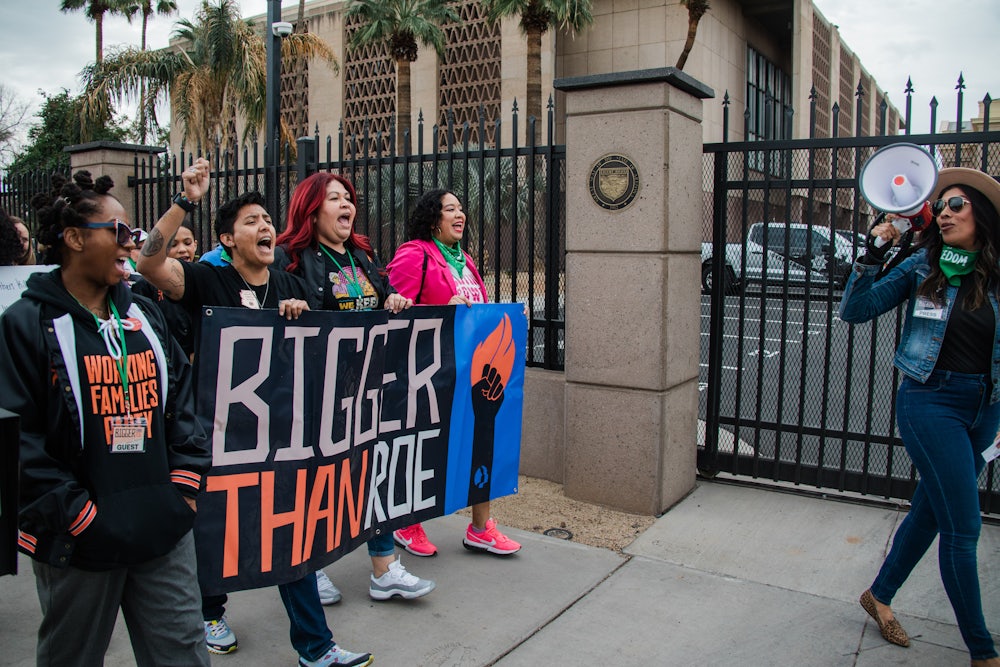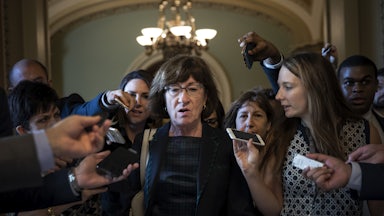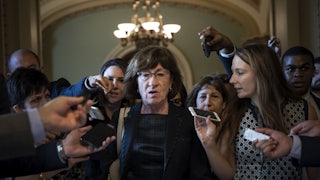The Arizona Supreme Court hoisted a sword of Damocles over the state on Tuesday by reviving a near-total ban on abortion that had been moribund for almost a half-century.
“To date, our legislature has never affirmatively created a right to, or independently authorized, elective abortion,” Justice John Lopez IV wrote for the majority. “We defer, as we are constitutionally obligated to do, to the legislature’s judgment, which is accountable to, and thus reflects, the mutable will of our citizens.”
The law appears to be the oldest abortion ban in the United States to become enforceable since the U.S. Supreme Court overturned Roe v. Wade in 2022. The 1864 law predates Arizona statehood itself by almost a half-century. It would also impose some of the severest restrictions in the country when it goes into effect. The law only allows the procedure to be performed to save the mother’s life; it does not include exceptions for rape and incest.
The state Supreme Court’s ruling will not take effect immediately. The court’s justices instead held that the decision could only be enforced “prospectively” under the stay and that it would be suspended for two weeks while the parties in the case decide what their next course of action will be in the lower courts.
“It is a dark day in Arizona,” Arizona Governor Katie Hobbs, a Democrat, said in a statement after the ruling was announced. “We are just fourteen days away from one of the most extreme abortion bans in the country.”
Tuesday’s ruling will have significant consequences for Arizonans who want to end a pregnancy. While neighboring states like California and Nevada allow the procedure on much more expansive terms, the costs of out-of-state travel may put it beyond access for many pregnant patients. It will also have major ramifications for state politics as Republicans continue to wrestle with the electoral backlash to overturning Roe.
At the center of the legal battle were two competing state laws on abortion. In March 2022, then-Governor Greg Ducey signed a law that would ban abortions after 15 weeks of gestation. But the state also did not repeal existing statutes that had banned the procedure more broadly, including the 1864 law adopted by the territorial legislature.
The 2022 law did not take effect immediately because Roe v. Wade remained the law of the land. That barrier fell in June 2022 when the Supreme Court erased the constitutional right to obtain an abortion in Dobbs v. Jackson Women’s Health Organization. After Dobbs, abortion providers and state officials faced off in court over whether the 15-week ban had superseded the earlier ones.
Lower courts held that the 15-week ban, as the most recently enacted statute, was the operative one. But a four-justice majority on the state Supreme Court disagreed. “We conclude that [the 2022 law] does not create a right to, or otherwise provide independent statutory authority for, an abortion that repeals or restricts [the 1864 law], but rather is predicated entirely on the existence of a federal constitutional right to an abortion since disclaimed by [Dobbs],” Lopez wrote.
Two of the justices, Ann Timmer and Robert Brutinel, argued that the court should have instead read the later law to clarify the earlier one. The two laws, they wrote, “can and should be interpreted harmoniously to permit their joint enforcement until the legislature or the people, through the initiative process, say otherwise.” They argued that the state legislature could not have intended to “hide elephants in mouseholes,” borrowing a phrase from an unrelated U.S. Supreme Court precedent.
A seventh justice, Justice Bill Montgomery, had recused himself from the case in December after Planned Parenthood’s Arizona chapter found a 2017 Facebook post where he said the group was responsible for the “greatest generational genocide known to man.” The court’s membership expanded from five to seven in 2016 after Arizona Republicans passed a bill to add two new seats, which they promptly filled with two Republican justices.
Tuesday’s ruling comes less than a week after organizers announced that they had gathered enough signatures to put a ballot initiative on abortion rights on the November ballot. If voters approve the measure this fall, the state constitution would protect a “fundamental right to abortion” up to the point of fetal viability. Arizona lawmakers would only be able to regulate the procedure before then to advance a “compelling state interest,” essentially restoring the pre-Dobbs framework.
Another open question is whether the 1864 law will truly take effect. Top state officials, including Hobbs and Arizona Attorney General Kris Mayes, said they would decline to enforce the law while in office. The state’s county prosecutors have sent mixed signals about whether they will follow suit. Nevertheless, even if some officials decline to enforce the ban, its effect will be felt in other ways. Eight of the state’s nine clinics that perform abortions closed after Dobbs because of the legal uncertainty surrounding abortion access in the state, leading to a sharp drop in abortions in the state.
This week, former President Donald Trump roiled Republican conversations about a potential national abortion ban if the Republican Party retakes power in Washington this fall. In a vague video statement on Monday, he appeared to suggest that he supported a state-by-state approach but did not rule out signing federal legislation that would restrict abortion. (A de facto second-term playbook for the Trump administration known as “Project 2025” erases any uncertainty in this regard: “The Dobbs decision,” it reads, “is just the beginning.”) Though Trump has said he supports in vitro fertilization access and abortion exceptions for rape and incest, he has also often touted his role appointing three justices in the Dobbs majority. Some high-profile Republicans have already refused to follow his lead.
The Arizona ruling added to that uncertainty by forcing some Republican candidates and officials in the Grand Canyon State to go on the defensive. The court’s most high-profile critic from the right was Kari Lake, the GOP’s 2022 nominee for governor and its current nominee for a Senate seat. “I oppose today’s ruling, and I am calling on Katie Hobbs and the State Legislature to come up with an immediate common sense solution that Arizonans can support,” Lake said in a statement.
Other potentially vulnerable Republicans also criticized the ruling. “Today’s ruling is a disaster for women and providers,” Representative Juan Ciscomani, a Republican who represents a swing district that he won by just 400 votes in 2022, said on Twitter. “In Arizona, our 15-week law protected the rights of women and new life. It respected women and the difficult decision of ending a pregnancy—one I will never personally experience and won’t pretend to understand.”
Despite some Republicans’ criticism of the ruling, it is nevertheless the product of a concerted effort by their party to make it nearly impossible to obtain an abortion in the state—both by overturning Roe v. Wade at the national level and by appointing state Supreme Court justices to an expanded court who would be willing to enforce an abortion ban that predates women’s suffrage by more than 50 years.
Lopez, the decision’s author, insisted that the ruling “does not rest on the justices’ morals or public policy views regarding abortion.” For their sake, I hope that is correct. By imposing a near-total ban on abortion upon Arizonans from above, the state Supreme Court may have only opened the door for the state’s voters to enshrine more permissive abortion laws than would have otherwise existed. The ruling’s impact may only be temporary from a legal perspective. But its effects will be enduring for Arizona women who must make life-altering decisions until then.










